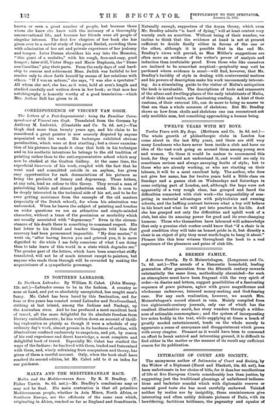CORRESPONDENCE OF VINCENT VAN GOGH.
The Letters of a Post-Impressionist : being the Familiar Corre- spondence of Vincent van Gogh. Translated from the German by Anthony M. Ludovici. (Constable and Co. '7n. 6d. net.)—Van Gogh died more than twenty years ago, and his claim to be considered a great painter is now scarcely disputed by anyone acquainted with his work. His technique exhibited obvious peculiarities, which were at first startling; but a closer examina- tion of his pictures has made it clear that both in his technique and in his aesthetic intentions he belongs to the old tradition of painting rather than to the anti-representative school which may now be studied at the Grafton Gallery. At the same time, the superficial bisarrerie of his work, coupled with the fact that he went mad and committed suicide in an asylum, has given easy opportunities for rash denunciations of his pictures as being the products of lunacy and degeneracy. These letters, at any rate, lend no colour to this theory. They reveal a man of painstaking habits and almost pedestrian mind. He is seen to be deeply interested in the technical side of his art, and to be for ever getting assistance from the example of the old masters (especially of the Dutch school), for whom his admiration was unbounded. When he leaves the subject of painting and touches on wider questions we see an attractive and simple-minded character, without a trace of the pessimism or morbidity which are usually associated with "degeneracy." Even in the circum- stances of his death there is something to command respect. His last letter to his friend and teacher Gauguin told him that recovery had been pronounced impossible. "My dear master," it went on, "after having known you and grieved you, it is more dignified to die while I am fully conscious of what I am doing than to take leave of this world in a state which degrades me." The greater part of the letters, which have been somewhat stiffly translated, will not be of much interest except to painters, but anyone who reads them through will be rewarded by making the acquaintance of a sympathetic personage.


























































 Previous page
Previous page